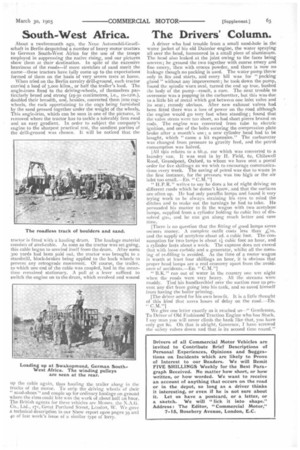The Drivers' Column.
Page 15

If you've noticed an error in this article please click here to report it so we can fix it.
A driver who had trouble from a small sand-hole in the water jacket of his old Daimler engine, the water spraying all over the head, hammered in a small piece of aluminium. The head also leaked at the joint owing to the faces being uneven ; he ground the two together with coarse emery and fine emery, then with crocus powder, and there is now no leakage though no packing is used. The water pump threw only in fits and starts, and every bill was for " packing gland " without any improvement ; he took down the pump, found the spindle worn oval, turned the end up true, bushed the body of the pump—result, a cure. The next trouble to overcome was a popping in the carburetter, but this was due to a little bit of metal which got between one inlet valve and its seat; remedy obvious. After new exhaust valves had been fitted there was a loss of power on the road although the engine would go very fast when standing ; found that the valve stems were too short, so had short pieces brazed on ends. The engine was converted from tube to electric ignition, and one of the bolts securing the compression plate broke after a month's use ; a new cylinder head had to be bought, which " came a bit expensive." The carburetter was changed from pressure to gravity feed, and the petrol consumption was halved.
I All this relates to a 6h.p. car which was converted to a laundry. van. It was sent in by H. Field, 62, Chilswell Road, Grandpont, Oxford, to whom we have sent a postal order for live shillings as we wish to encourage communications every week. The saving of petrol was due to waste in the first instance, for the pressure was too high or the air inlet too small.—En. " C.M."1
" H.P.R." writus. to say he does a lot of night driving on different roads which he doesn't know, and that the surfaces are often up. He had only paraffin lamps and. found it very trying work to be always straining his eyes to mind the ditches and to make out the turnings he had to take. He persuaded his master to fit the wagon with two acetylene lamps, supplied from a cylinder holding 6o cubic feet of dissolved gas, and he can get along much better and save time.
[There is no question that the fitting of good lamps saves owners money. A complete outfit costs less than Loa, and the supply of acetylene about 2d. a cubic foot. The consumption for two lamps is about IAcubic foot an hour, and a cylinder lasts about a week. The expense does not exceed that with loose carbide and a generator, whilst all the messing of re-filling is avoided. As the time of a motor wagon is worth at least four shillings an hour, it is obvious that proper head lamps are a real economy apart from the avoidance of accidents.—En. " C.M."1 " B.K." ran out of water in the country one wet night when the roads were very heavy. All the streams were muddy. Tied his handkerchief over the suction rose to prevent any dirt from going into his tank, and so saved himself from having the boiler priming. [The driver acted for his own benefit. It is a little thought of this kind that saves hours of delay on the road.—En.
We give one letter exactly as it reached us—" Gentlemen, To Driver of Old Fashioned Traction Engine who has Stuck.
say man you will never climb the bank like that, you have only got So. Oh that is alright, Governor, I have screwed the safely valves down and that is its second time round."
























